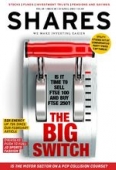Archived article
Please note that tax, investment, pension and ISA rules can change and the information and any views contained in this article may now be inaccurate.
Is the motor sector on a PCP collision course?

Drivers could face tougher affordability checks to qualify for car loans, according to recent press headlines. This could have negative implications for many of the car retailers whose shares trade on the London stock market.
The potential clampdown on car loans is related to concerns that a new financial crisis could be brewing. Drivers may soon have to complete an affordability test similar to the ones used when applying for a mortgage.
Reports state the amount of money being borrowed to buy new cars has trebled over the past eight years to more than £30bn, although booming higher ticket new car sales and a soaring UK population mean the size of the market has also grown.
PCP PILE-UP?
An estimated nine out 10 new car sales are now financed by ‘personal contract plans’ (PCP) which can enable people on low incomes to afford brand new cars.
Drivers pay a small upfront fee and then a monthly ‘rental’ before buying the car outright or handing back the vehicle and upgrading to a different car after several years.
Headlines predicting a financial apocalypse on a par with the credit crunch are teetering toward the hysterical.
Daksh Gupta, respected chief executive of automotive retail and leasing group Marshall Motor (MMH:AIM), informs Shares that ‘all of the finance houses we deal with do affordability tests and credit checks; it’s in their interests.’
He says ‘our default rate with both of our two biggest funders is well less than 1% and has been for years. It is not the dealer that makes the lending decision, it is the finance company, and they have stringent lending criteria.’
Gupta is also keen to stress that PCP funding is highly affordable, typically with ‘low single digit APRs (interest rates)’. It is also an asset-backed form of financing.
‘Ultimately PCPs enable customers to drive newer, more economical cars for affordable payments whilst enjoying their residual value being protected,’ says Gupta.
CAR SALES BOOM
‘PCP has been massive for the new car market,’ concedes Zeus Capital analyst Mike Allen. ‘At over 80% penetration that is what has been driving the new car market.’
Helped by PCP, the UK’s new car market grew by 8.4% in March, with 562,337 new cars registered according to the Society of Motor Manufacturers & Traders (SMMT). That makes it the biggest month since records began. However, the latest SMMT forecast points to a 5% year-on-year decline for 2017 as a whole.
Allen comments: ‘2017 is expected to remain another competitive year with almost 70 new launches planned over the next 12 months giving consumers significant choice with low cost finance still available.
‘We believe new car price inflation will become a more prominent issue in 2017, and we believe there is evidence of this coming through albeit with monthly payments on PCPs maintained, offset by lower dealer contributions, slightly higher interest costs or higher customer deposits required.
‘While the first quarter of 2017 will go down as a record for the industry, we believe the true impact of Brexit has yet to play out,’ adds Allen.
‘OEM (original equipment manufacturer) behaviour over the coming months is likely to be increasingly forex driven, and we are monitoring consumer confidence trends carefully.
‘We also note the change in (vehicle) tax rules that came into force in April. As the SMMT has stated this has likely pulled sales forward into the first quarter, meaning registrations trends will likely weaken from here.’
SHOULD I STILL INVEST IN CAR RETAILERS?
For those still keen to invest in the sector, Allen believes the PLC dealer valuations are attractive and remain close to trough levels.
‘Balance sheet strength across the sector is generally robust, and we are likely to see further consolidation activity as smaller operators become more distressed in our view.
The Zeus Capital expert also points out that motor dealers typically generate roughly 60% of their pre-tax profits during the first half, so the bumper March sets them up nicely for the rest of 2017.
‘We believe our forecast assumptions are very conservative and more than compensates for this risk and therefore believe the sector remains attractive on a long-term basis,’ says Allen.
STOCK IDEAS
We agree with Allen’s view that car retailers with flexible balance sheets and strong operating models are the ones to own.
Allen name-checks Vertu Motors (VTU:AIM), which has ‘the strongest balance sheet in the sector’, and admires the Mark Lavery-led franchised motor dealer Cambria Automobiles (CAMB:AIM).
We would also highlight the attractions of Gupta’s Marshall Motor, growing organically and via acquisitions and boasting a property-backed balance sheet.
The UK’s seventh largest dealer group’s latest annual results showed underlying pre-tax profit up 60.4% to £25.4m in 2016 and a bigger-than-expected 85% dividend increase to 5.5p.
Marshall Motor is trading at 170p, a discount to latest reported net assets per share of 188p, which to us represents a strong buying opportunity. (JC)
Important information:
These articles are provided by Shares magazine which is published by AJ Bell Media, a part of AJ Bell. Shares is not written by AJ Bell.
Shares is provided for your general information and use and is not a personal recommendation to invest. It is not intended to be relied upon by you in making or not making any investment decisions. The investments referred to in these articles will not be suitable for all investors. If in doubt please seek appropriate independent financial advice.
Investors acting on the information in these articles do so at their own risk and AJ Bell Media and its staff do not accept liability for losses suffered by investors as a result of their investment decisions.
Issue contents
Big News
- Energy in a spin over plans for power price cap
- Wincanton joins list of potential takeover targets
- Virgin Money shrugs off unsecured debt concerns
- Sportech easier to swallow after pools sale
- Tritax investors offered cheap shares
- Spanking for Sports Direct
- Robotics stocks could get boost from Trump policies
- Whitbread burnt by Costa sales decline
Editor's View
Feature
Great Ideas Update
Investment Trusts
Larger Companies
Money Matters
Smaller Companies
Story In Numbers
- ZPG could tap £3bn revenue opportunity
- £1,470: Moneysupermarket saves you money but is it a good investment?
- 71 month high: French business activity
- FTSE 350 sectors, best performers
- Commodity prices this year selection
- £150m: Debenhams’ costly to-do list
- $5.4trn: Record ETF flows boost world’s largest asset manager
- £100bn: Search advertising market is booming

 magazine
magazine









